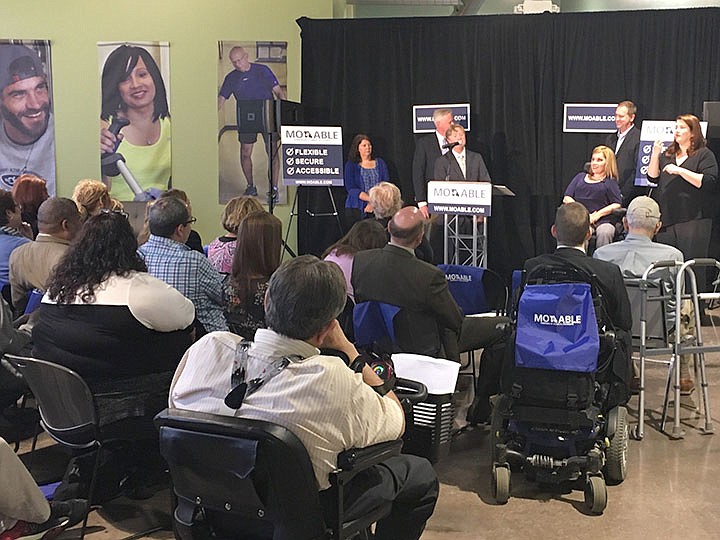For young men in their 20s - like Elijah Mayfield, of Jefferson City, and Paul Meyer, of St. Louis - the launch of MO ABLE Accounts provides a sense of financial stability for their future.
The tax-incentive savings account are based on the federal Achieving a Better Life Experience (ABLE) Act of 2014.
Both Mayfield, who was born with Down syndrome, and Meyer, who suffered from brain tumors at a young age which contributed to his disability, have proven their disabilities don't define their capabilities. Both men, who work part-time in the State Capitol, advocated for the legislation when it was in its primitive form in Congress and want control of their financial future.
"With Elijah being an adult and working, the timing for this program is just perfect because now he has the ability to contribute financially to his future," said Todd Mayfield, father of 21-year-old Elijah.
Monday morning was the first time Missourians living with disabilities could take charge of their finances by signing up for a MO ABLE account, allowing account holders to save more than $2,000 without affecting any state or federal assistance they may be receiving.
Many parents and caregivers agree this savings account is a step in the right direction for the state providing a piece of mind in the event of an emergency.
Mayfield's father explained not being able to set up a trust fund for a child can be an unsettling thought for any parent. Prior to the ABLE Act being enacted in Missouri in 2015, no person with disabilities who received assistance could have assets in their name.
"This has been a concern since Elijah was born," Mayfield said. "We thought the burden would fall to our youngest daughter, but this account allows us to set aside money for him to be able to accrue without being taxed and worrying about losing his benefits."
With $50, any person who has been diagnosed with a disability prior to age 26 is eligible to enroll. A single person can contribute up to $8,016 in a year, and a married couple can contribute up to $14,000.
This is one less worry for family members who want to contribute to their loved one's financial stability without worrying about how the person may access it.
The first $100,000 is shielded from asset limits, but any amount above $100,000 will be considered a personal asset and will affect a person's eligibility for supplemental security income. Those limits do not apply to Medicaid benefits.
Any funds withdrawn into an ABLE account will not be taxed if they are used for qualified expenses such as education, assistive technologies, medical costs, transportation, housing and person support services. Purchases that would not qualify may include gambling and purchasing alcohol.
Cathy Brown, public policy coordinator at Paraquad, described the ABLE accounts as game-changers for people with disabilities. Paraquad is a St. Louis-based nonprofit that works to empower people with disabilities to increase their independence through choice and opportunity.
"People with disabilities are more likely to live in poverty than any other minority population," Brown said. "ABLE accounts give people the opportunity to save for the future and to be less reliant on government assistance programs and charity - and really have a stable financial future."

